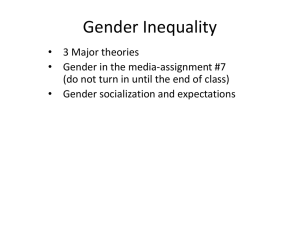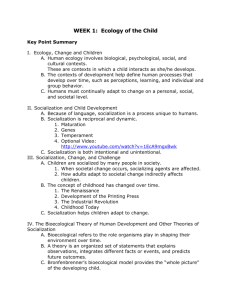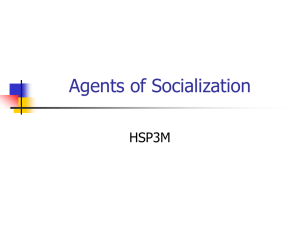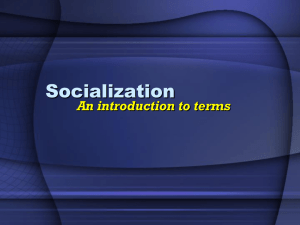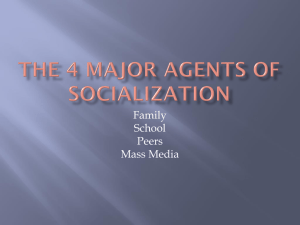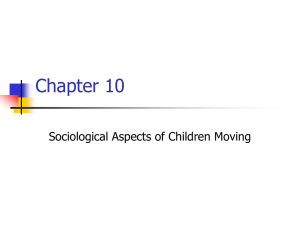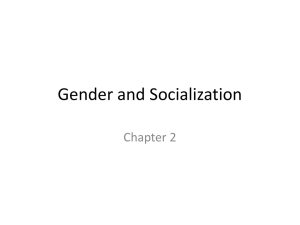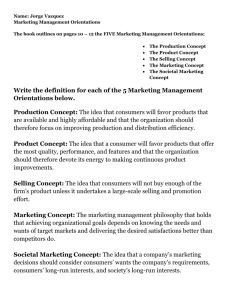Feminist Therapy
advertisement
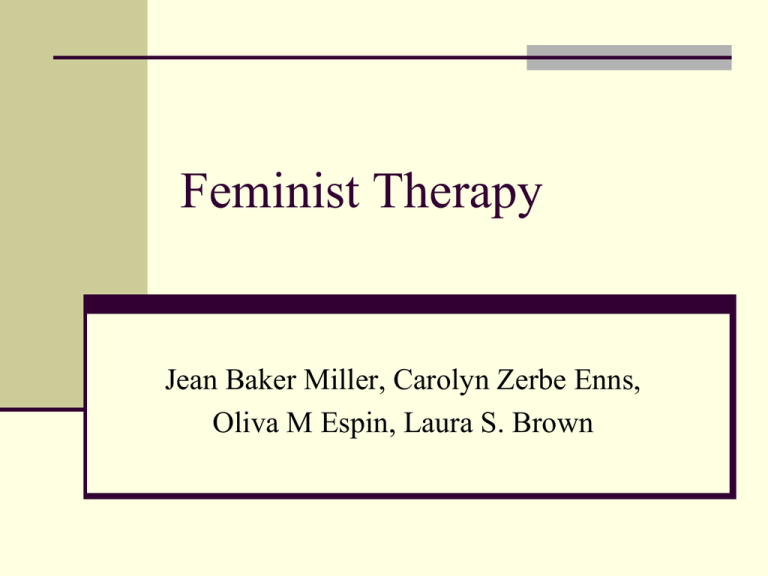
Feminist Therapy Jean Baker Miller, Carolyn Zerbe Enns, Oliva M Espin, Laura S. Brown A 1. self-reliant 4. defends own beliefs 7. independent 10. athletic 13. assertive 16. strong personality 19. forceful 22. analytical 25. has leadership abilities 28. willing to take risks 31. makes decisions easily 34. self-sufficient 37. dominant 43. willing to take a stand 46. aggressive 49. acts as a leader 55. competitive 58. ambitious B 2. yielding 5. cheerful 8. shy 11. affectionate 14. flatterable 17. loyal 23. sympathetic 26. sensitive to needs of others 29. understanding 32. compassionate 35. eager to soothe hurt feelings 38. soft-spoken 41. warm 44. tender 47. gullible 50. childlike 53. does not use harsh language 56. loves children 59. gentle 2 Bem’s Gender 1. self-reliant 4. defends own beliefs 7. independent 10. athletic 13. assertive 16. strong personality 19. forceful 22. analytical 25. has leadership abilities 28. willing to take risks 31. makes decisions easily 34. self-sufficient 37. dominant 43. willing to take a stand 46. aggressive 49. acts as a leader 55. competitive 58. ambitious Role Inventory (1971) 2. yielding 5. cheerful 8. shy 11. affectionate 14. flatterable 15. happy 17. loyal 23. sympathetic 26. sensitive to needs of others 29. understanding 32. compassionate 35. eager to soothe hurt feelings 38. soft-spoken 41. warm 44. tender 47. gullible 50. childlike 53. does not use harsh language 56. loves children 59. gentle 3 Background Role of social, political and cultural context in individual’s problems Power: central aspect in human relations Perspective of psychological theories: White European middle class men Male gender role as normative The dominant group considers what is different from them as deviant or “not as good” 4 Women’s movement of the 1960’s Reaction against limited female gender roles Gender socialization affects women’s development and well-being Cultural conceptions of gender serve as an organizing principle in people’s identity Traditional therapy: way to maintain the status quo Need for psychological theories that take into account women’s perspectives and political realities 5 1970’s and 1980’s Research on gender bias Self-in relation models: validate relational and cooperative dimensions of women's experience Research emphasis on body image, eating disorders, abusive relations, sexual abuse Expanded focus to: multiple oppressions, multicultural competence, and social justice Incorporate ideas about gender socialization in working with men -- Men’s Movement 6 Two Views of Development Androcentric: male-oriented constructs constitute the norms used to draw conclusions about humans, including female nature Traditional women’s gender roles and dispositions of connectedness and inter-dependence are devalued & independence and autonomy are exalted Relational cultural theory- challenges the Androcentric view Women’s identity and self-concept develop in the context of relationships Accepts the notion of intrinsic gender differences 7` Two Views of Development Gendercentric: There are two separate innate paths of development for women and men. Socio-cultural and power analyses challenges the Gendercentric view (socialization process) Traditional women’s gender roles and dispositions have been acquired/learned in the context of women’s subservient position Rejects the notion of intrinsic gender differences 8 Common Themes in Feminist Philosophies Gender socialization is central to therapeutic practice for men & women A socio-political and cultural perspective is essential in understanding people’s problems Ethnicity, race, sexual orientation, class, age & disabilities Symptoms may be self-preservation responses to an oppressive environment 9 Goals of Therapy Empowerment Help clients free themselves from the internalized constraints of gender role socialization and oppression Societal change Social change to eliminate sexism and other forms of oppression 10 Techniques and Strategies Egalitarian counselor-client relationship Actively engage client in setting the direction, goals, length and procedures of therapy Therapist Self-disclosure To decrease power differential Gender Role Analyses/Intervention Emphasize societal as opposed to intra-psychic origin of problems Examine how internalized societal expectations regarding gender roles are related to client’s issues Internalized homo phobia, racial devaluation 11 Techniques and Strategies Power analysis Raise awareness of power difference between men and women in society. Help clients recognize different kinds of power they possess and how they and others exercise power – personal and societal levels Assertiveness Training 12 Techniques and Strategies Bibliotherapy To help educate clients about societal issues Increases clients’ expertise and decreases power differential in therapy Social Action Encourage clients to actively influence social change regarding women/other oppressed groups Helps empower clients by making the connection between society and personal problems 13 1972 2011 14 Contributions Brought awareness to the impact of the cultural context and multiple oppressions Gave validity to women’s perspectives Sexual conduct in therapeutic relations has been recognized and sanctioned Strengths in women's qualities of nurturance and cooperation (rather than competition) are recognized Established as proper focus of therapy to change oppressive conditions rather than just expect clients to adapt to them 15 Limitations Feminist therapy does not take a neutral stance regarding gender roles May put undue pressure on clients to follow a specific direction Not all clients may be interested in engaging in social action Over-emphasis on environmental factors may Neglect exploration of the intra-psychic world Motivate clients to forsake responsibility for themselves in the face of an unjust world 16
